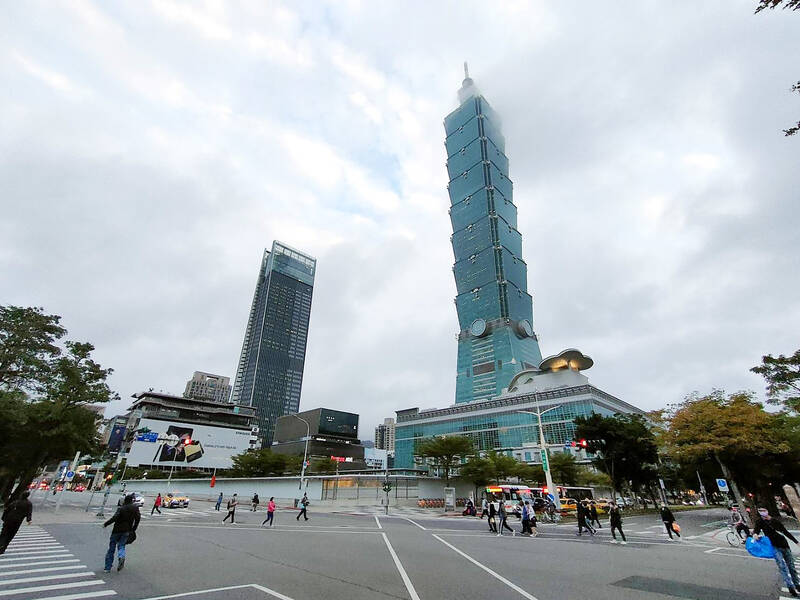Taipei 101, in the capital’s prime Xinyi District (信義), won the “King of the Land” title for the 10th straight year, with the value of office space in the skyscraper rising to NT$6.55 million (US$213,286) per ping (3.3m2), the Taipei City Government said.
The adjustments means the value of the landmark building is NT$1.98 million per square meter for taxation purposes next year.
Homeowners must pay land taxes annually, but land value increment taxes only upon selling their houses.

Photo: Hsu Yi-ping, Taipei Times
The Shin Kong Tower near Taipei Railway Station in Zhongheng District (中正) ranked second, at NT$6.29 million per ping, it said.
The city government said the citywide assessment was based on a survey of property transactions from Sept. 2 last year to Sept. 1.
During the period, the number of real-estate deals fell 3.6 percent to 29,672, but property prices gained 5.81 percent, it said.
The trend is attributable to building material price increases and a slowdown in GDP growth, it added.
Robust demand for upscale office space in central business districts pushed up the value of Taipei 101 offices, as well as those in high-rise buildings nearby, it said.
Property prices in all of the city’s 12 districts picked up, at 3.71 percent on average, while 2.76 percent of the area assessed posted flat prices and 0.27 percent saw price corrections, it said.
Nangang District (南港) reported the fastest price growth, at 4.56 percent, thanks to improving infrastructure facilities linked to the city government’s Eastern District Gateway Project (東區門戶計劃), it said.
Neihu District (內湖) was second, posting a 4.2 percent uptick on the back of housing demand, it said.
Wanhua District (萬華) registered the smallest increase, at 3.02 percent, as commercial activity in the Ximending (西門町) area took a hard hit from the COVID-19 pandemic, it said.
Taipei Department of Land Administration Commissioner Chang Chih-hsiang (張治祥) said land value increment taxes do not affect people who do not engage in property transactions.

‘SWASTICAR’: Tesla CEO Elon Musk’s close association with Donald Trump has prompted opponents to brand him a ‘Nazi’ and resulted in a dramatic drop in sales Demonstrators descended on Tesla Inc dealerships across the US, and in Europe and Canada on Saturday to protest company chief Elon Musk, who has amassed extraordinary power as a top adviser to US President Donald Trump. Waving signs with messages such as “Musk is stealing our money” and “Reclaim our country,” the protests largely took place peacefully following fiery episodes of vandalism on Tesla vehicles, dealerships and other facilities in recent weeks that US officials have denounced as terrorism. Hundreds rallied on Saturday outside the Tesla dealership in Manhattan. Some blasted Musk, the world’s richest man, while others demanded the shuttering of his

Taiwan’s official purchasing managers’ index (PMI) last month rose 0.2 percentage points to 54.2, in a second consecutive month of expansion, thanks to front-loading demand intended to avoid potential US tariff hikes, the Chung-Hua Institution for Economic Research (CIER, 中華經濟研究院) said yesterday. While short-term demand appeared robust, uncertainties rose due to US President Donald Trump’s unpredictable trade policy, CIER president Lien Hsien-ming (連賢明) told a news conference in Taipei. Taiwan’s economy this year would be characterized by high-level fluctuations and the volatility would be wilder than most expect, Lien said Demand for electronics, particularly semiconductors, continues to benefit from US technology giants’ effort

ADVERSARIES: The new list includes 11 entities in China and one in Taiwan, which is a local branch of Chinese cloud computing firm Inspur Group The US added dozens of entities to a trade blacklist on Tuesday, the US Department of Commerce said, in part to disrupt Beijing’s artificial intelligence (AI) and advanced computing capabilities. The action affects 80 entities from countries including China, the United Arab Emirates and Iran, with the commerce department citing their “activities contrary to US national security and foreign policy.” Those added to the “entity list” are restricted from obtaining US items and technologies without government authorization. “We will not allow adversaries to exploit American technology to bolster their own militaries and threaten American lives,” US Secretary of Commerce Howard Lutnick said. The entities

Minister of Finance Chuang Tsui-yun (莊翠雲) yesterday told lawmakers that she “would not speculate,” but a “response plan” has been prepared in case Taiwan is targeted by US President Donald Trump’s reciprocal tariffs, which are to be announced on Wednesday next week. The Trump administration, including US Secretary of the Treasury Scott Bessent, has said that much of the proposed reciprocal tariffs would focus on the 15 countries that have the highest trade surpluses with the US. Bessent has referred to those countries as the “dirty 15,” but has not named them. Last year, Taiwan’s US$73.9 billion trade surplus with the US